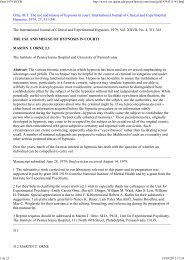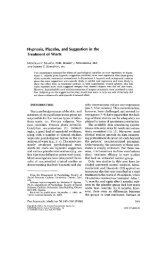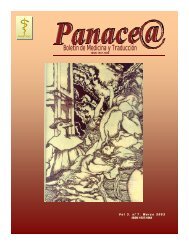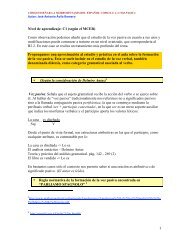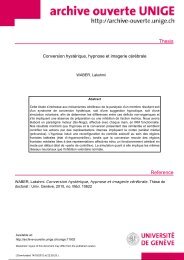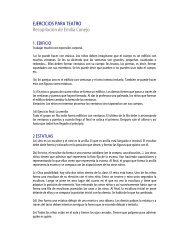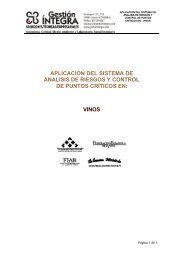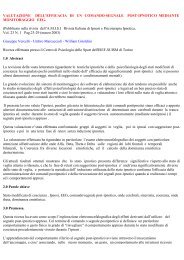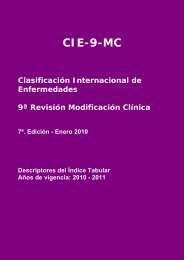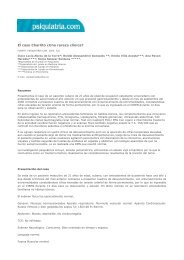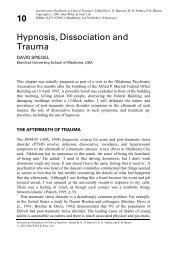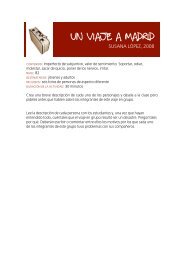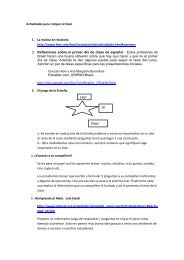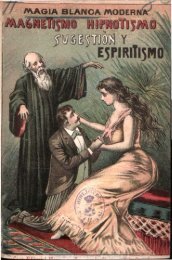Hypnosis and the Law: Examining the Stereotypes
Hypnosis and the Law: Examining the Stereotypes
Hypnosis and the Law: Examining the Stereotypes
Create successful ePaper yourself
Turn your PDF publications into a flip-book with our unique Google optimized e-Paper software.
1286 CRIMINAL JUSTICE AND BEHAVIOR<br />
as a potentially valuable tool for uncovering accurate memories, <strong>the</strong>y consider it to be a<br />
liability (Diamond, 1980; Orne, 1979; Webert, 2003). Indeed, as a result of expert evidence<br />
on this subject, in <strong>the</strong> United States, in <strong>the</strong> majority of states in which <strong>the</strong> issue has come<br />
to court, a per se exclusion rule has been applied such that victims <strong>and</strong> witnesses who<br />
have been interviewed with hypnosis have been banned from giving evidence in court<br />
(Webert, 2003). However, it has been found necessary to exclude defendants from this ban,<br />
as this would affect <strong>the</strong> defendant’s constitutional right to testify <strong>and</strong> call witnesses on his<br />
or her behalf. In <strong>the</strong> United Kingdom, <strong>the</strong> Home Office (1988) has also produced guidelines<br />
discouraging <strong>the</strong> use of hypnosis as a police interviewing tool. If we assume that hypnosis<br />
is some sort of unusual brain state that reduces critical reasoning <strong>and</strong> produces<br />
irreversible memory distortions, <strong>the</strong>n, of course, it might make sense to place a ban on hypnotically<br />
elicited testimony <strong>and</strong> hypnotic memory enhancement techniques generally.<br />
Viewed in terms of normal social <strong>and</strong> cognitive processes again, however, things may not<br />
be quite as negative as at first <strong>the</strong>y might seem.<br />
The most generally accepted explanation for <strong>the</strong> false memory effect is that because of<br />
<strong>the</strong> expectancies associated with hypnosis <strong>and</strong> pressure brought to bear by <strong>the</strong> investigating<br />
hypnotist to remember more, hypnotized witnesses sometimes adopt a more lax criterion<br />
for report (Wagstaff, 1999a, 1999b; Webert, 2003). To most participants, it is fairly obvious<br />
that hypnotic procedures are expected to enhance accurate memory (indeed, in many<br />
experiments, explicit instructions are given to this effect). For example, Wagstaff, Vella, <strong>and</strong><br />
Perfect (1992) found that participants simulating jurors were more likely to believe testimony<br />
if <strong>the</strong>y were told it had been elicited under hypnosis. Hypnotized participants may<br />
<strong>the</strong>refore attempt to fulfill this requirement by giving some additional details about which<br />
<strong>the</strong>y were previously unsure, resulting in increases in incorrect information. In addition,<br />
because of a belief that hypnosis improves memory, some participants may report vague<br />
details or imaginings as confident memories, assuming that because <strong>the</strong>y are created in <strong>the</strong><br />
hypnotic context, <strong>the</strong>y must be accurate (Lynn & Nash, 1994; Webert, 2003). In support of<br />
this view, a variety of evidence suggests that hypnotically created pseudomemories <strong>and</strong><br />
false confidence effects can be reduced to nonhypnotic levels under conditions that<br />
encourage more cautious <strong>and</strong> truthful reporting, such as when participants are told that a<br />
“hidden-part” of <strong>the</strong>m can describe <strong>the</strong>ir “real” memories, when <strong>the</strong>y are cross-examined<br />
under oath (Spanos, Gwynn, Comer, Baltruweit, & de Groh, 1989), when <strong>the</strong>y are given a<br />
financial incentive for accurate reporting (Murray, Cross, & Whipple, 1992), or when <strong>the</strong>y<br />
are given an opportunity to deny being in a trance (Wagstaff & Frost, 1996). False memory<br />
reports with hypnosis are also reduced when it is implied that <strong>the</strong> experiment is terminated<br />
(Barnier & McConkey, 1995), when participants are contacted by telephone at <strong>the</strong>ir home<br />
after <strong>the</strong> experiment (McConkey, Labelle, Bibb, & Bryant, 1990), <strong>and</strong> when rapport with<br />
<strong>the</strong> hypnotist is downgraded (Sheehan, Green, & Truesdale, 1992).<br />
The exact extent to which hypnotically induced pseudomemories are reversible, or can<br />
be reduced by warnings, has been a matter of some controversy (Green, Lynn, & Malinoski,<br />
1998). Research using a range of more forensically relevant items suggests that <strong>the</strong><br />
extent to which hypnotically created pseudomemories are reversible depends crucially on<br />
participants’ perceptions about how <strong>the</strong>ir disavowals are likely to be evaluated by o<strong>the</strong>rs<br />
(Spanos et al., 1989). It seems, <strong>the</strong>refore, that in <strong>the</strong> short term, <strong>and</strong> for some participants<br />
at least, pseudomemories attributable to <strong>the</strong> influence of hypnotic procedures are more<br />
likely to reflect reporting biases ra<strong>the</strong>r than permanent memory distortions. It can also be<br />
Downloaded from<br />
http://cjb.sagepub.com at SAGE Publications on October 31, 2008



